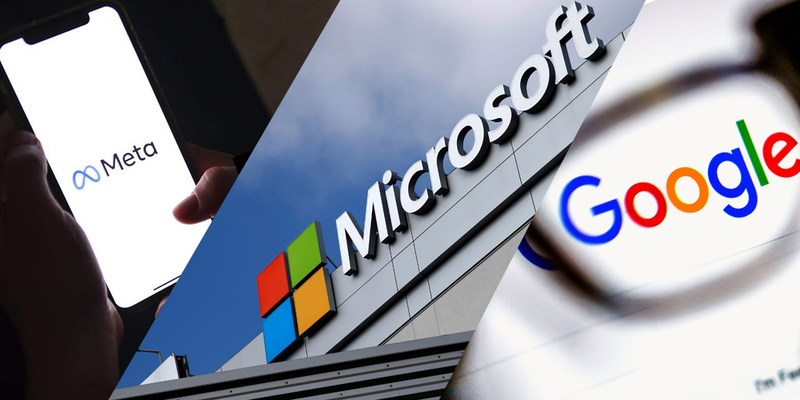[ad_1]
Artificial Intelligence (AI) has swiftly transitioned from a futuristic concept to a cornerstone of modern technology, reshaping industries and daily life. Leading this transformation are tech giants Microsoft, Google, and Meta, each investing billions into AI development. This article delves into their strategies, financial commitments, and the broader implications of this trillion-dollar AI race.
Microsoft: Integrating AI Across the Board
Microsoft has seamlessly woven AI into its suite of products, enhancing user experience and productivity. A notable example is Copilot, an AI assistant embedded in applications like Word and Excel, designed to streamline tasks and boost efficiency. This integration has resonated with enterprises; nearly 70% of Fortune 500 companies have adopted Copilot, with firms like Vodafone reporting weekly time savings of approximately three hours per employee.
Financially, Microsoft’s AI endeavors are yielding significant returns. In the fiscal quarter ending September 30, 2024, the company reported a 16% increase in revenue, totaling $65.6 billion. This growth was largely driven by Azure and cloud services, which saw a 33% increase in revenue, with 12 percentage points stemming from AI-related products and services.
To support this AI expansion, Microsoft has invested heavily in infrastructure. The company spent $20 billion in the recent quarter, evenly divided between building data centers and acquiring computing equipment like servers and AI chips. This substantial investment underscores Microsoft’s commitment to meeting the growing demand for AI services.
Google: Building a Comprehensive AI Ecosystem
Google’s approach to AI focuses on developing a complete stack, from hardware to software, to create powerful and efficient systems. The company has made significant strides in AI integration, with AI now generating about 25% of all new code at Google, subsequently reviewed by human engineers before deployment.
The impact of AI on Google’s services is evident. Google Lens handles over 20 billion visual searches each month, and AI-enhanced search features serve more than a billion people across 100 countries. In the business sector, Google Cloud, which houses the company’s AI services, grew 35% in the recent quarter, generating $11.4 billion in revenue.
To sustain this growth, Google invested $13 billion in the recent quarter, with $7 billion directed toward new data center construction specifically for AI. The company relies on a mix of custom Tensor Processing Unit (TPU) chips and Nvidia’s GPUs to power its AI initiatives.
Meta: Embracing Open-Source AI
Meta has taken a unique approach by adopting an open-source strategy for its AI development. This means making some of its AI tools and models available to the public, fostering collaboration and innovation within the programming community.
The integration of AI into Meta’s social platforms has been substantial. AI-driven recommendations have increased time spent on Facebook by 8% and on Instagram by 6%. In the advertising domain, over a million advertisers used Meta’s AI tools last month alone to create more than 15 million ads, boosting conversion rates by about 7% for businesses utilizing AI-generated images.
Meta’s commitment to AI is further demonstrated by its investment of $9.2 billion in the recent quarter, with around 60% allocated directly to servers and AI-specific hardware. The company follows a strict five-year cycle for updating its equipment, ensuring it remains at the forefront of technological advancements.
The Broader Implications
The combined efforts of Microsoft, Google, and Meta highlight a collective belief in AI’s transformative potential. In a single quarter, these three companies collectively generated approximately $182.5 billion in revenue, with a net income of about $66.7 billion. This excludes other tech giants like Amazon and Apple, underscoring the massive scale of investment and return in the AI sector.
However, these advancements come with challenges. Building data centers is a complex endeavor, often taking up to two years and requiring locations with sufficient power and cooling capabilities. Additionally, the energy consumption of these centers is significant, prompting companies like Google to commit to powering their AI data centers with nuclear energy, aiming to generate 500 megawatts of carbon-free power.
[ad_2]
Source link





